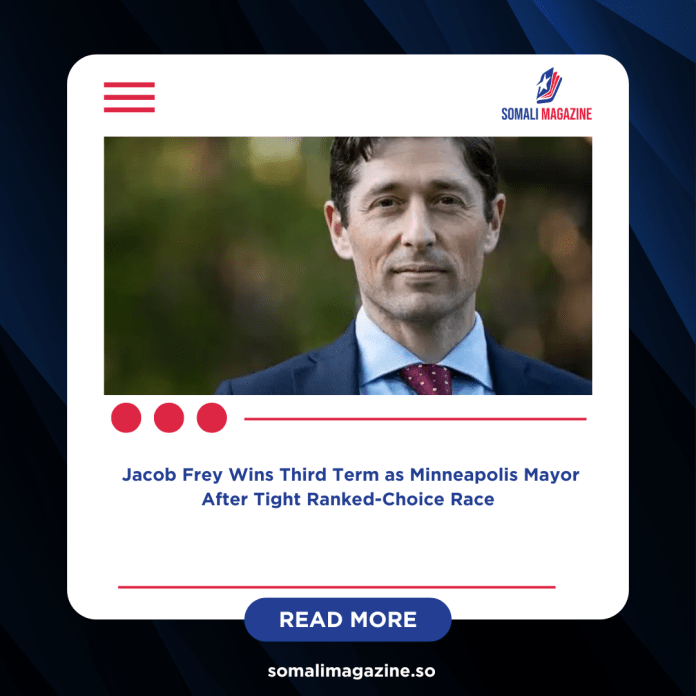Facebook Twitter (X) Instagram Somali Magazine - People's Magazine
Minneapolis Mayor Jacob Frey has secured a third term after winning just over half the vote in the city’s ranked-choice election. Frey edged out state Sen. Omar Fateh after a second round of vote counting, where second-choice ballots were redistributed. Unofficial results showed Frey with about 50% of the vote, while Fateh trailed at around 44%. On election night, Frey led the first-choice count with roughly 42%, followed by Fateh at 32%. The remaining candidates, including the Rev. DeWayne Davis and attorney Jazz Hampton, were eliminated in the first round after earning 14% and 10% respectively.
This year’s turnout set a record for a Minneapolis municipal election, with over 147,000 ballots cast — about 55% of registered voters. Under the ranked-choice system, voters can select up to three candidates in order of preference. If no candidate wins more than half the votes in the first round, the lowest-ranked contenders are eliminated, and their supporters’ next choices are distributed until someone passes the 50% threshold.
Frey, a moderate Democrat first elected in 2017, campaigned on progress in public safety, affordable housing, and police reform. He highlighted falling crime rates compared to recent years, a drop in homelessness, and city data showing that rent increases have slowed. He also emphasized ongoing police reforms under court-enforced agreements and a housing plan that mixes affordable and market-rate developments. Frey said his administration’s focus remains on making Minneapolis both safer and more affordable.
Fateh, a democratic socialist serving his second term as a state senator, campaigned on a more progressive platform. His proposals included a city income tax on high earners, rent control, stronger tenant protections, and an end to the clearing of homeless encampments. Fateh, along with fellow candidates Davis and Hampton, encouraged their supporters to rank the three challengers and leave Frey off their ballots in hopes of defeating the incumbent through ranked-choice redistribution.
After conceding, Fateh said the campaign had changed the city’s political conversation. “They may have won this race, but we have changed the narrative about what kind of city Minneapolis can be,” he said. “Truly affordable housing, workers’ rights, and public safety rooted in care are now central to that conversation.”
Frey, who led Minneapolis through the aftermath of George Floyd’s 2020 murder and a major reduction in police staffing, pledged to continue reforming the department while rebuilding its ranks. “From this moment through my final seconds as mayor, I will work tirelessly to make our great city a place where everyone can build a brilliant life in an affordable home and a safe neighborhood,” Frey said after his victory.
Voting data showed Frey performed strongest in southwest Minneapolis and the downtown area, while Fateh led in neighborhoods like Powderhorn, Lyn-Lake, Phillips, Cedar-Riverside, and around the University of Minnesota. Although Fateh received more second-choice votes overall, it wasn’t enough to close Frey’s early lead.
The election results set the stage for another term of divided leadership at City Hall. Progressives are expected to maintain a slim majority on the City Council but will likely fall short of the numbers needed to override mayoral vetoes. Frey, who has frequently clashed with the council over policing, rideshare pay, and environmental policy, said he will soon outline his priorities for the next term. The City Council is expected to officially certify the results on Monday.

